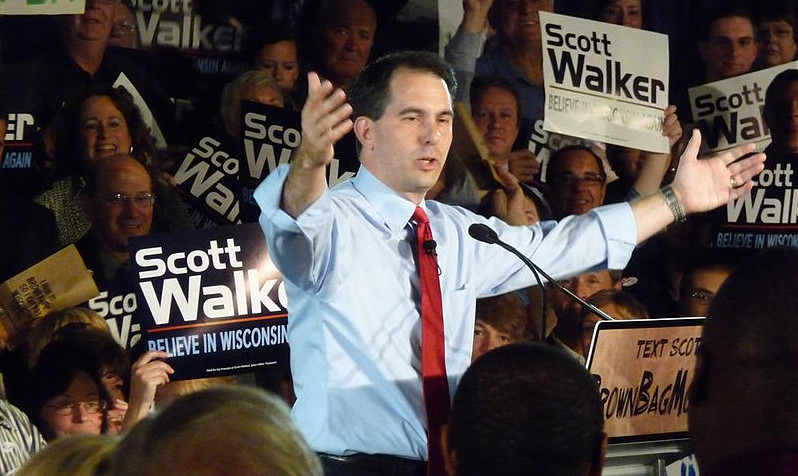We’re not yet in the year 2014 (and an election season that will determine the composition of Congress for the remainder of President Obama’s second term,) nonetheless talk of 2016 presidential nominees is popping up on the left and right. Republicans in particular are guilty of premature speculation on who would make their party’s best candidate, the Washington Post going as far as to say the Republican primary is in full swing. Any instance a senator showboats or a governor makes rounds in South Carolina or Iowa, whispers immediately follow over his or her presidential potential.
Wisconsin Gov. Scott Walker shared his two cents on the Republican nominee for 2016 last month. In an interview with ABC, the GOP politician said his party should pick a former or current governor for the presidential and VP nominations, to cultivate a D.C. outsider appeal.
“I think its got to be an outsider, I think both the presidential and vice presidential nomination needs to be a former or current governor, people who have done successful things in their states, taken on big reforms, who are ready to move America forward.”
Limiting Republican presidential nominees to current and past governors would focus the nomination process, potentially benefit the party. At the moment the GOP has a bevy of contenders to carry the Republican torch in 2016. Senators Marco Rubio, Rand Paul – hailed as the mainstream, easier to swallow Republican edition of his father – and Ted Cruz have all entertained presidential rumors in addition to Rep. Paul Ryan, and governors Walker, Bobby Jindal of Louisiana, and Chris Christie of New Jersey.
The medley of GOP options stands in stark contrast to Democrat 2016 buzz, which as of yet revolves around Hillary Clinton. According to a CNN/ORC poll published in November, 63 percent of Democrats say they would vote for Clinton. High profile Democrat politicians who might have a shot at a 2016 run are publicly putting themselves behind the former Secretary of State.
New York Senator Kirsten Gillibrand recently said she was on the Hillary Clinton “bandwagon” for 2016.
Putting aside Walker’s evident self endorsement, his thoughts on a GOP governor for the 2016 run are well worth considering. Though 2016 election is a long way off, Congressional approval last month fell to nine percent, a record low. The odds that the legislature will achieve significant public opinion redemption in the next two years is highly unlikely: we’re looking at the second half of the president’s second term and Congress is gridlocked. Republicans will gladly continue their strategy of obstructionism instead of giving a Democrat president a win before he leaves office. On top of a recalcitrant congress, the muddled healthcare roll-out is hurting Obama’s approval rating, making the prospect of another former-senator presidential candidate unattractive to voters. It’s safe to say being a congressional insider will do a Republican candidate no favors at the moment.
In addition to Congress’s unpopularity, a handful of GOP governors are currently in great standing in their respective states. Christie won reelection in Democrat leaning New Jersey by a landslide; he boasts a number of policy accomplishments in the Garden state including the creation of 143,000 private sector jobs and reform of teacher tenure and pension systems. Governor Walker is also a front runner in early primary talk. New Republic made a strong case that he is the candidate to unify a fractured Republican Party: he’s an outsider, a reputed union-buster, he “speaks the language of the religious right,” and “has the tone, temperament, and record of a capable and responsible establishment figure.”
Commentators say that an accomplished governor outsider could bring together mainline Republicans and marginalize Tea Party extremists and moderates to take the nomination, and then maybe the presidency.
Given the current landscape of Republican politics, I believe it overly optimistic to say unification the GOP, particularly for a primary race, can be accomplished simply by an ‘outsider’ with religious chops and an ability to appeal to the Republican business base. ‘Marginalizing‘ the Tea Party in the primary race especially is easier said than done. The suicide caucus has relatively strong candidates in its arsenal like Rand Paul and recently Ted Cruz. Additionally, primary elections are dominated by the extreme end of a party’s electorate (i.e. Tea Party Republicans who identify as ‘very conservative’ and are over 65.) All presidential candidates are forced to play the balancing act of pandering to the far right or left to win the primary, and to then back track as they advertise themselves to middle of the road voters for the general election. The Tea Party could prove to stretch the 2016 GOP candidate too thin as he or she fights off ideological warriors like Paul or Cruz for the nomination.
It will be interesting to see if Walker pulls Tea Party voters from someone like Paul or Cruz and still manages to maintain popularity with moderate Republicans. But the GOP primary could become a battle similar to the one we saw in November during the government shutdown: business-backed establishment Republicans versus ideologically rigid Tea Party upshots. The Tea Party demonstrated it’s more than willing to damage the Republican brand to get a point across. And if it catalyzes a brutal and divisive primary season, whichever Republican candidate emerges might be too battered to wage a winning general election campaign. The Republicans should keep in mind that it might take more than a governor to coax the suicide caucus off its ledge.
